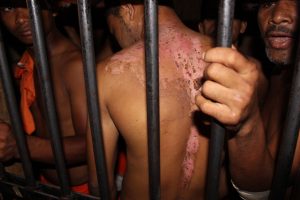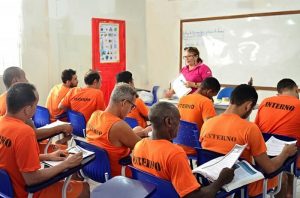Inside the Pedrinhas Complex: a symbol of the collapse of the prison system
The work of NGOs like Conectas, who inspect and monitor activities in places like the Pedrinhas complex shows that a safer society depends on the application of and respect for basic human rights.

“The only good thing about Maranhão is the Pedrinhas Prison. (…) do we have to give those villains (prisoners) a good life? Fuck them and that’s that. That’s what I think.” These were the words of the then federal congressman, Jair Bolsonaro, when he was nominated for the presidency of the Human Rights Commission in the House of Deputies, in 2014. In an interview with journalists, the politician went on to say that “thugs” should not be defended as though they were disenfranchised. According to him, his commission would not be helping this type of minority. Bolsonaro was beaten by the PT politician, Assis do Couto.
At the time, conditions at the Pedrinhas Penitentiary Complex — now the São Luís Penitentiary Complex — were already unsustainable. Just between June and July of that year, three men were found dead in their cells in less than 48 hours. Violent uprisings and murders by hanging were routine. In the following year, the authorities were also informed of an act of cannibalism that had taken place in 2013, when a prisoner was killed by a rival faction and his liver was barbecued and eaten by the ringleaders.
In 2013, violence in the prison reached a peak with constant rebellions and 64 deaths recorded, making it a symbol of unmanageability and the collapse of the Brazilian prison system. At the time, a partnership between the Maranhão government and the federal government was signed, announcing a series of measures to contain the situation. Currently, under Bolsonaro’s presidential management, according to the State Secretary of Penitentiary Administration (SEAP), there is no formal partnership with federal government: “the relationship in place is with the National Penitentiary Department, as they are the ones responsible for inspecting and providing support to the Penitentiary system throughout the country.”
Read more
Conectas Lawyer, Henrique Apolinário, who is a member of the CNPCT (National Committee for the Prevention and Combat of Torture), recalled that although the collapse of the system is structural, pervaded with local and federal government action, some aspects of the new government are particularly striking. “Firstly, the flippant, almost celebratory behaviour of the president regarding the deaths of people in prison.” Said the Lawyer. “Secondly, the same president has always been transparent in his support of torture and of the inhuman living conditions inside the detention centres.”

A prisoner in the Pedrinhas Prison Complex shows burn marks on his back. According to the detainee, the injury was caused by hot water thrown by a police officer at the time he was arrested. São Luís (MA) – Brazil.
According to Apolinário, Pedrinhas is still in constant danger of uprisings and massacres. “Recently, we could talk about progress in administration, which has led to a specific improvement in access to study, for example. However, the architecture of the complex is old, and many units are not suitable for humans to live in as they lack ventilation and light.”
In November 2018, the prison was visited by a delegation from the Organisation of American States (OAS). The organisation said the prison unit should carry out an extensive overhaul according to international regulations, which include specific norms for hygiene, weather conditions, heating and lighting, and also stipulate that prisoners should be separated according to the crimes committed, not merely because they belong to a particular faction.
Without specifying progress in the building work, SEAP, stated that the overhaul is underway. The Secretary also provided information about the functioning of three sheds built as workspaces, such as clothing workshops, a laundry room, silkscreen workshops, broom-making workshops, a flip-flop workshop and a cleaning product factory. Although no specific date has been set, another shed is due to be built.
With space for 2,950 people, being occupied by 3,972 prisoners, Pedrinhas is facing additional problems. “Sporadic improvements are constantly overshadowed by the continued hyper-incarceration, that hampers sustainable management of life in the Complex.” Apolinário believes.
In order to alleviate overcrowding, the government relies on collective efforts by the Public Defender’s Office in correcting irregularities in prison orders. In 2019, this kind of action was carried out in the towns of Itapecuru Mirim, Davinópolis, Balsas and Rosário, as well as a task force in the municipality of Chapadinha scheduled for September. According to SEAP, in São Luís, support is given according to the needs presented by the prison units, but the state capital also has assistance from Judicial Penitentiary Specialists (EPJ) who periodically carry out surveys of the demand for priority diagnosis to be sent to the Public Defender’s Office.
Currently the Maranhão Penitentiary system has 136 workshops and 2,250 detainees working. In addition, 2,592 prisoners are involved in educational activities. In Pedrinhas, prisoners who are under semi-open arrest work on paving the roads and constructing buildings for use by public bodies of the state. The number of people who passed Enem (PPL) (public university entrance exam for people deprived of liberty) because of primary and secondary school level classes, was another result to be celebrated in 2018.

In 2018, 431 detainees at the Complex passed Enem PPL, the university entrance exam for people deprived of liberty and for young people in correction centres. The pass rate was over 50%.
Despite persistent gaps, efforts have led to a noticeable reduction in violence at the Complex. “Last year we managed to reduce the [the number of] deaths from 61 to 3, which I’m actually indignant about because I wish it was zero.” Flávio Dino recalled, at the American event. In 2019, one death has been recorded at the prison until now. The work of NGOs like Conectas, who inspect and monitor activities in places like the Pedrinhas complex, show that a safer society depends on the application of an respect for basic human rights.






